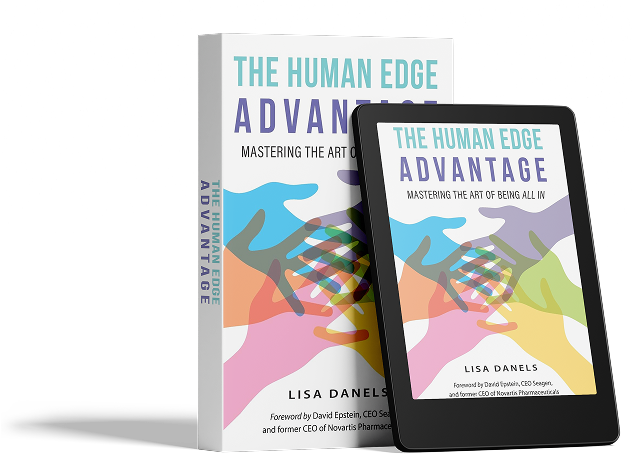Recently, I’ve noticed a pattern when talking with my coaching clients: people are struggling to use their intuition at work, either because former managers have told them not to, or because they don’t know how. This is a problem because it means we are missing out on confidently using our expertise, making faster decisions, and giving our organizations the business advantage they need in today’s ever-changing world. Let me explain.
Intuition – Describing what you can’t see
Let’s start from the beginning: what is intuition? Sometimes referred to as instinct, gut feeling, or sixth sense, our intuition is an inner compass that can point us in the right direction. It can appear as a voice in our head or a bodily sensation, like a pit in our stomach or a feeling that our heart is beating faster. The tricky thing is that it’s rarely straightforward. We must put some effort into deciphering what it wants to tell us, but when we do, it can save us a lot of energy and time. When we listen to our intuition, we are quieting the noise around us and able to hear what’s most important to and for us. This means we are living in alignment with our core values and unique purpose in life.
Sometimes, we think of intuition as something we either have or don’t have, and if we don’t have it, well, then tough luck. This couldn’t be farther from the truth. In fact, each one of us, through practice, can learn to cultivate our intuition (tips on how to do this further down). Daniel Kahneman, a renowned psychologist most known for his book Thinking Fast and Slow, defines intuition as “nothing more and nothing less than recognition.”
In other words, if we spend a lot of time thinking about and working on something, after a while, we develop an unconscious way of knowing that relies on our brain’s ability to recognize patterns. An experienced botanist, for example, who has spent a decade tending gardens, does not need to think twice about arranging a new vegetable patch. Through years of experience, she knows instinctively, immediately upon entering her client’s new garden, which area is best suited to set up a new planter box, where the sun rises and sets, and which plants to put precisely where.
Is Intuition Better than Hard Data?
To be clear, I am not talking about replacing data-driven decisions with intuition. What I am advocating for is an integration between data and intuitive thinking. Relying only on our gut would be just as wrong as disregarding it altogether.
An example is the shift we have seen in recruiting practices over the past decade. We have come a long way – and have a long way to go – when it comes to implementing objective, data-driven practices for increased diversity, equity, and inclusion in recruiting. Hiring candidates based on gut or whether we like them (unconscious bias) is a no-go and needs to become a thing of the past. What we believe is intuition is really cognitive bias and we believe it to be true because it makes us feel comfortable and safe. We need to mitigate this by working on becoming more conscious of our cognitive biases and by constantly testing and questioning our instincts.
The challenge with data is that it can only recognize what we’ve already experienced. It tends to be more left-brain-focused. Intuition emerges from the brain’s right side, making 11 million connections per second. So, I am calling to stop our obsession with data at the expense of access to our intuition, and that magical something we can’t really put our finger on but that makes each of us unique.
Okay but…How is This Relevant for My Work Environment?
To understand the importance of intuition for our work, we must look at the cost of not using it. Imagine the botanist would not use her intuition but rather spend many hours (maybe even days) analyzing and writing down the exact sun trajectory in her client’s garden and varying temperatures during the day and night. She’d then go back to the library and map out which plants are adequate for such an environment, spending hours scanning through hundreds of plants and vegetables and producing dozens of possible scenarios for setting up this vegetable patch.
Of course, our botanist would have to add those hours to her client’s bill, which would probably put a serious damper on our botanist’s commercial advantage (and the client’s happiness…), right? Imagine all the clients she can’t attend to and all the new businesses she can’t win because she’s stuck in front of a spreadsheet for days.
To forego our intuition has a very real price tag and time cost to it. We are slower in our decision-making, miss out on opportunities, and are more risk-averse. Put differently: by investing in their team’s intuition, managers can put their teams at an advantage. Experts who use their instincts at work can respond to new and ambiguous situations quicker and usually more accurately.
Herbert Simon, an American decision-making expert, states that chess grandmasters usually form an initial hypothesis about the best next move within five seconds. Four out of five times, this move is the one they’ll choose to go with. A bonus side-effect in developing intuition is that the more comfortable experts become in trusting their gut, the more confident they become. Thus, they are more likely to be engaged at work and remain in the job.
So, What can We Do to Build our Intuition?
We know that data and intuition aren’t contradictory concepts. Instead, intuition is a form of data. Renowned intuition researcher Gary Klein states that rational thinking and intuition are two complementary aspects of our cognition.
In practice, this means that, along with developing our intuition, we also need to learn when to use a data-based approach and when to rely on our intuition. Leadership expert Connson Chou Locke recommends rational thinking for problems with clear decision rules, objective criteria, and enough data to perform in-depth analysis. Intuition, however, should be used as a mental shortcut for situations with a lot of ambiguity, pressure, and little time.
According to Bozoma Saint John, former head of marketing at Netflix, Uber, and Apple, we can treat our intuition like a muscle. The more we practice, the stronger we become. As a starting point, Saint John recommends creating a list of pros and cons for any decision. While reading, we can reflect on how the pros and cons really make us feel and if we are noticing getting swayed one way or the other.
What I recommend to my clients:
- Sit in stillness: take five minutes every day to sit quietly. Observe your thoughts without judgment and let go of the urge to “do”. For those five minutes, all you have to do is “be”. Over time, this practice of making mental space will allow your intuition to come to you and be noticed.
- Set a developmental goal: make this a formal goal for the next quarter and practice it with your manager. When working on a problem, share your intuitive thoughts with them (i.e. you say “something tells me we should get a second opinion on this new software we’re about to invest in” / “the numbers on our budget plan feel off”) and then ask them to help you check them (i.e. your manager says “what would a second opinion tell us that we don’t already know?” / “how do you want to test this feeling?”).
- Observe yourself: pick one area of your life where you are already applying your intuition (i.e., cooking, sports). Keep a two-week journal reflecting on how you use your instincts and how they serve you.
- Ask questions: become curious about how people around you arrive at their decisions and learn from them.
Creating a Culture of Intuition
Investing in building an intuitive culture in your company means making your company leaner and increasing people’s abilities to respond quicker to ever-changing environments. Leaders: encourage your employees to use their intuition. Please do this by modeling the use of your own intuition and by creating a safe environment for your employees to talk about their gut feelings. Experts: practice and make it a habit to tap into your intuition. With a bit of courage, you can fundamentally change how you add value to your team.
References
Kahneman: https://fs.blog/daniel-kahneman-on-intuition/
Herbert Simon: https://fs.blog/on-expertness-and-intuition/
Bozoma Saint John: https://www.success.com/bozoma-saint-johns-tips-to-live-unapologetically/
Connson Chou Luck: https://hbr.org/2015/04/when-its-safe-to-rely-on-intuition-and-when-its-not
Gary Klein: https://journals.sagepub.com/doi/10.1518/001872008X288385





